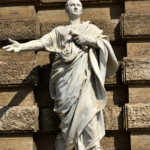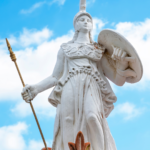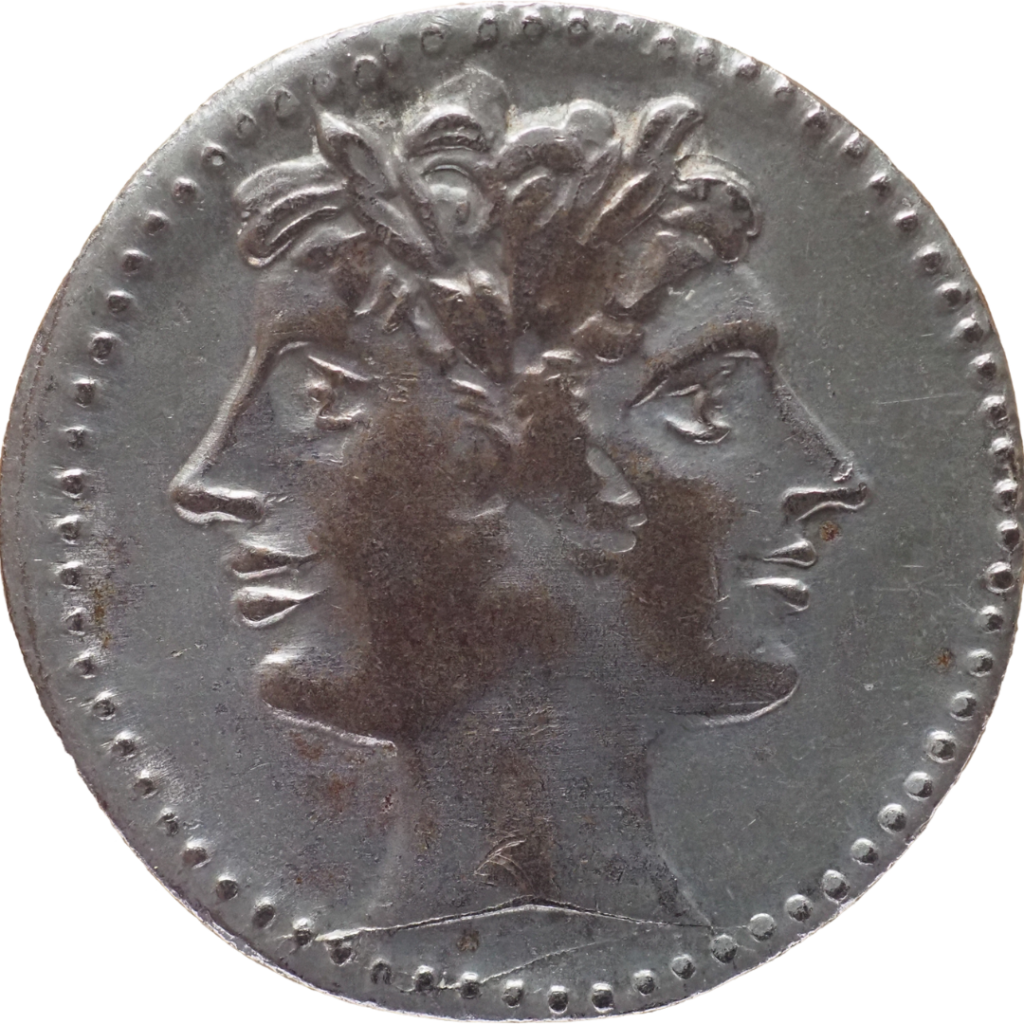 I’ve always heard terms like ‘different as two sides of a coin’ or ‘two sides to every story.’ And as an amateur historian, I am constantly reminded that history is written by the victors. I found many examples of this researching the MacKay Mysteries. And I am finding even more as I study the ancient Celts in Gaul (Europe) for the new series.
I’ve always heard terms like ‘different as two sides of a coin’ or ‘two sides to every story.’ And as an amateur historian, I am constantly reminded that history is written by the victors. I found many examples of this researching the MacKay Mysteries. And I am finding even more as I study the ancient Celts in Gaul (Europe) for the new series.
The Romans, for example, often referred to these tribal people as barbarians. They called them Galli, which translates to barbarian in Latin. They believed them to be a threat to classical civilization. And none were more vocal than Julius Caesar. Perhaps this made him feel superior, or maybe it justified his attacks on them. Written examples exist of him saying that these barbarians wore no clothing other than animal pelts. He further states they lived in huts where they ate and slept on the floor. While expressing these sentiments, Caesar most likely wore the finest white woolen toga. Receipts from Roman markets at that time record purchases of finely woven wool. Where did this fine, expensive wool come from? The Celts! If they were capable of that, I wonder why they wore pelts.
In the area around Hallstadt, the Celts mined salt. Not only does salt preserve meat, but many personal effects have been found by archaeologists abandoned in the mines. These items, which generally degrade over time, are still intact: rope, leather, fabrics, clothing, and wooden furniture. I’ve seen copies of chairs and tables with intricately carved patterns. With furniture such as this, why would they sit on the floor? The clothing was woven in brightly colored checkered patterns—no wonder the Scots love their colorful tartans.
 Other examples cite the ancient Celts as being so barbaric they couldn’t read. They had no form of written language. From the Greeks, however, we learn that the Celts were highly eloquent, placing great importance on their use of words. So high was their value of words that important information, such as the names of their gods, was never given out. They believed that if the enemy knew the name, it gave them power over them. Several Greeks of the time mentioned how the Celts spoke in rhymes and played word games. So, who do you believe?
Other examples cite the ancient Celts as being so barbaric they couldn’t read. They had no form of written language. From the Greeks, however, we learn that the Celts were highly eloquent, placing great importance on their use of words. So high was their value of words that important information, such as the names of their gods, was never given out. They believed that if the enemy knew the name, it gave them power over them. Several Greeks of the time mentioned how the Celts spoke in rhymes and played word games. So, who do you believe?
During the American Revolution, a colonist would tell you they were fighting for independence, freedom from British tyranny, and taxation without representation. The Loyalist perspective, however, looked upon this as a rebellion against legitimate authority.
In more recent times, during WWII, the Allied propaganda stated Germans ate babies. However, in Germany, it was rumored the British and Americans consumed them in great measure. Such is propaganda.
So Dave and I had to smile yesterday on our continued local explorations. We often look for historical markers and stop to read them. We saw a sign for Christ Church (1736) and a War of 1812 site near a settlement known as Chaptico. Meaning deep water, it was established in 1639 near a Native American village mapped by John Smith in 1608. It was officially recognized in 1683.
Over one hundred years later, during the War of 1812, the British attempted to sneak up the river and raid Washington, D.C. The story has it that as the ships came up the river, sailors came ashore, plundering homes and destroying the property of the local citizens. On 30 July 1814, the British moored at the Chaptico Wharf and marched to Christ Church. From there, the stories differ significantly.
 One American claimed, “the British conduct would have disgraced cannibals… the houses were torn to pieces, the well which afforded water to the inhabitants was filled up.”
One American claimed, “the British conduct would have disgraced cannibals… the houses were torn to pieces, the well which afforded water to the inhabitants was filled up.”
Another claimed, “The Church and the ashes of the dead shared an equally bad or worse fate.” He goes on to say that the deceased’s remains were disturbed, the church glass was broken, and the altar was destroyed. He goes into great detail about vaults being ransacked and the desecration of the bodies. “Yes, my friend, the winding sheet was torn from the body of a lady of the first respectability, and the whole contents of the vault entirely deranged!”
At the same time, Rear Admiral Sir George Cockburn reported to his superiors that he “took quiet possession of Chaptico without opposition.” He states he visited many houses where families lived quietly, considering themselves entirely at his disposal. He further says, “I caused no further inconvenience to them than obliging them to furnish supplies and stock for the forces under my orders.” According to Cockburn, they reembarked without molestation.
visited many houses where families lived quietly, considering themselves entirely at his disposal. He further says, “I caused no further inconvenience to them than obliging them to furnish supplies and stock for the forces under my orders.” According to Cockburn, they reembarked without molestation.
Captain Robert Rowley reported to his superiors that “the ladies, who had heard of our good behavior at Leonard’s Town, remained and sang and played at the piano while the men fled.” The British took “70 hogsheads of tobacco, some flour, and military stores but preserved their houses.”
Who does one believe?

Great article Carol. Interesting to see the difference in view point on the same event.
Thanks! Glad you enjoyed it.